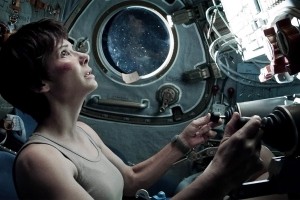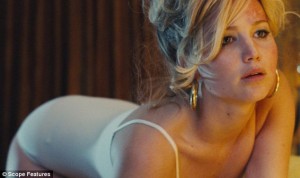Ellen DeGeneres has nothing whatsoever to be nervous about. The show will spillover past midnight and nobody will be completely happy with the overall results. Oh, and somebody will dare to tell a Seth MacFarlane joke that dies a horrible death with the audience – which didn’t hate him last year nearly as much as some of you did. So much for what I’m sure will happen. What follows is what I suppose will happen. (Predicted winners are in bold.)
Best picture
“12 Years a Slave”
“The Wolf of Wall Street”
“Captain Phillips”
“Her”
“American Hustle”
“Gravity”
“Dallas Buyers Club”
“Nebraska”
“Philomena”
It’s axiomatic that whatever the Producers’ Guild goes with as best-in- show grabs the Big One at the end of Oscar Night, no questions asked. But this year’s producers’ vote ended with both 12 Years a Slave and Gravity in a dead heat. In case you’re wondering, or scoring, that’s never happened before. So in at least this case and, maybe, one other below, there’s some genuine suspense invited to this year’s barbecue.
At times like this, Past History is your only guide. And what Past History tells you, with its arm around your shoulder and an avuncular, if apologetic intimacy, is that given the choice between voting its hopes or its fears, Hollywood always – always – chooses hope.
Those who insist on seeing moviemakers as unilaterally hard-core liberals have good reason to suspect 12 Years a Slave will be awarded Best Picture if for no other reason than as a corrective to decades of demeaning, evasive depictions of antebellum slavery in American cinema. I’d like to think so, too, even with my own guarded enthusiasm for the movie itself.
But for those who believe Hollywood carries an impregnable missionary spirit either to right historic wrongs or to reward scathing socio-political criticism, I give you, from many available and appropriate examples, 1976: A year that submitted for the academy’s approval the following Best Picture nominees: All the President’s Men, Bound for Glory, Network, Rocky and Taxi Driver. Quite a list, you’ll agree, even from this vantage point; each of these movies, even the still-relatively undervalued Bound for Glory, can be viewed today as exemplars of what American movies can do when they reach beyond convention, which is why they all have lasting value almost 40 years later.
So given the choice between, in order, a recapitulation of a newspaper’s role in bringing down a U.S. President, a biopic of a leftist troublemaking troubadour, a scathing (and, in retrospect, prophetic) takedown of the commercial television industry, the feel-good story of a South Philly leg-breaker who wills himself to the threshold of boxing immortality and a feel-bad (and, in retrospect, prophetic) story of a sad little New Yorker who enlarges himself into a deluded would-be assassin…well, even if you weren’t alive at the time, you either know or already guessed how this turned out. Rocky was the eventual and (as Past History will acknowledge with a melancholy nod) inevitable winner.
You know what that means this year? I do. I’m pretty sure I do, anyway.
Granted, both Gravity and 12 Years a Slave feature protagonists who eventually survive, if not exactly triumph, over seemingly hopeless odds. Both movies are, in their respective manner, harrowing, riveting, well conceived and wonderfully acted. But few, if any, have accused Gravity of turning history into a horror movie as some have criticized 12 Years for. Moreover, as much as Hollywood constantly yearns for a do-over on its historic mistakes, it doesn’t always like to stare directly at what its evaded or shortchanged. It knows, Lord, how it knows what needs to happen – and sooner rather than later. But does it have to be, like, right now? This minute? The movie’s out there; it’s had an impact. We’ll do more. We promise. And next time, we’ll have a full-scale blowout and really celebrate…
Blah. Blah. Blah…
I should add that a Gravity win wouldn’t break my heart at all. It was an even better, braver movie in terms of narrative tactics than most critics have acknowledged. Its director (see below) has been one of the world’s best for some time now and the movie’s anointment would be a worthy acknowledgement of his previous best. And besides, the movie’s theme — that somehow, no matter how scary things get for us when there’s no air or weight or light, we’ll figure something out – is the kind of bolstering we can use in this present-day miasma we call The New Normal. So fine, Hollywood, vote your hopes and we’ll gladly take them to heart, too. But you’d better greenlight Nat Turner and Kindred, like, yesterday. A promise is a promise.
Best director
Steve McQueen — “12 Years a Slave”
David O. Russell — “American Hustle”
Alfonso Cuaron — “Gravity”
Alexander Payne — “Nebraska”
Martin Scorsese — “The Wolf of Wall Street”
Whether his movie wins Best Picture or not, Cuaron’s had this one sewn up since last summer when the world first beheld Gravity through 3D glasses. I could spend a few seconds of my allotted time complaining that he should have received such recognition for Y Tu Mama Tambien, The Children of Men and even Harry Potter and the Prisoner of Azkaban. But I wont. Virtue and virtuosity are usually their own rewards. And, for a change, both of these are given proper acknowledgement at the right time in a director’s career.
Best actor
Bruce Dern — “Nebraska”
Chiwetel Ejiofor — “12 Years a Slave”
Matthew McConaughey — “Dallas Buyers Club”
Leonardo DiCaprio — “The Wolf of Wall Street”
Christian Bale — “American Hustle”
What looked at the outset to be this category’s widest-open race in decades has by now nestled into a predictable groove. Oh, there were scattered scowls let loose into the digital ionosphere because of McConaughey’s loopy Golden Globes acceptance speech – which ultimately was, in Ralph Kramden’s deathless expression, “a bag of shells.” Dallas Buyers Club is the kind of Oscar candidate whose virtues are best absorbed through the small screen. (See Argo, if you can remember that far back.) However dazed-and-confused McConaughey comes across off-screen, you can easily imagine how his touching, physically invested on-screen rendition of a shabby-hustler-turned-impassioned-crusader captured voters’ hearts on all those DVD screeners. As Hollywood prefers to see itself as a mob of hustlers-with-hearts-of-gold, do you really think its citizenry will bypass this opportunity to pay tribute to its own self-aggrandizing heroic fantasies? It never has before, and it wont now.
Best actress
Amy Adams — “American Hustle”
Cate Blanchett — “Blue Jasmine“
Judi Dench — “Philomena”
Sandra Bullock — “Gravity”
Meryl Streep — “August: Osage County”
By contrast, what seemed a mortal lock in this category, even as early as last summer, has within the last few weeks morphed into something terribly, even poignantly vulnerable. The re-energized furor over Farrow-v-Allen may have subsided for the time being. But no one can really know how it affected voting until The Envelope is opened, which all of a sudden makes this disclosure worth staying awake for on Oscar Night. I’m going to presume that nothing changes — mostly because, whatever academy voters feelings about Dylan Farrow’s open letter and/or Woody Allen in general, they don’t like to be put into a corner. My onetime Entertainment Weekly office mate Mark Harris’s spider-sense is strong enough to intuit what might contribute to these voters’ collective grievance – and resentment:
“Oscar voters are, ludicrously, being asked to serve as jurors in a trial by op-ed: Is a vote for Blanchett to be treated as de facto indifference about the nightmare of child molestation, since Dylan Farrow has publicly contended that for a long time, she felt that any awards for Allen’s films “were a way to tell me to shut up and go away”? More to the point, is there any conceivable way to ask or answer that question without acknowledging that something horrible is being inappropriately trivialized and something trivial is being inappropriately transformed into a crisis of situational ethics? (ITALICS MINE) I’ve heard people say they think this controversy is useful because it opens up a larger discussion. I hope that who should win Best Actress isn’t the discussion they mean.”
To repeat, I’m betting it isn’t Still, the foofaraw went on just long enough for many pundits to pose the heretofore unthinkable question: If not Blanchett, then who? Given my own misgivings towards Blue Jasmine and, to a lesser extent, Blanchett’s performance, I would lean towards Adams if I had a vote. There’s even been some chatter about Dench’s crafty (in all senses) work in Philomena. But I suspect if anyone would benefit from a backlash against Blanch…I mean, Allen, it would be Bullock since she’s so widely beloved, and so was her movie. It’s still Blanchett’s to lose. But not by as much as was once believed. Whatever happens, it’ll be a chew toy for all media to deconstruct and, quite likely, dismember.
Best supporting actor
Barkhad Abdi — “Captain Phillips”
Bradley Cooper — “American Hustle”
Jonah Hill — “The Wolf of Wall Street”
Jared Leto — “Dallas Buyers Club“
Michael Fassbender — “12 Years a Slave”
Always the wildest card on the table, unless there’s a veteran involved who’s never received his due – and none can be found anywhere in this quintet. Leto was the early favorite and despite what some believed to be a more inappropriate Golden Globe acceptance speech than McConaughey’s, still owns the edge. (Again, think of how easily his movie hums into a living room with a home video player.) Still, there’s always a chance a newcomer like Abdi will repeat the precedent set by the late Haing S. Ngor in 1985 for The Killing Fields. (In both cases, there was a sense of heroism above and beyond the movie itself.) BAFTA did surprise Abdi (and us) with its own Supporting Actor prize. Then again, I’m not sure Dallas Buyers Club has crossed the pond yet. Fassbinder, for whatever it’s worth, would have been my pick. But if DiCaprio’s sadistic slaveholder in last year’s Django Unchained didn’t win (and it was a more magnetic performance than Christoph Waltz’s winning turn as the sympathetic bounty hunter), then neither shall this far more unhinged variation.
Best supporting actress
Jennifer Lawrence — “American Hustle”
Lupita Nyong’o — “12 Years a Slave“
June Squibb — “Nebraska”
Julia Roberts — “August: Osage County”
Sally Hawkins — “Blue Jasmine”
J-Law, a.k.a “Our Brando”, retains the post-position, and it’s well deserved. Nyong’o’s poised, yet assertive campaign, however, appears to have wowed academy members and watchers alike. And I’m starting to get the vague feeling that, whatever good will it carried at the season’s start, 12 Years a Slave could very well walk away from this thing empty-handed – and she’s lately been the most visible beneficiary of whatever love remains for the movie.
Best original screenplay
“American Hustle” — David O. Russell and Eric Warren Singer
“Blue Jasmine” — Woody Allen
“Her” — Spike Jonze
“Nebraska” — Bob Nelson
“Dallas Buyers Club” — Craig Borten and Melisa Wallack
Even before Dylan Farrow’s letter landed in the New York Times’ website, it was apparent that Allen ‘s script had little chance in this crowd of worthies; the most “writerly” of which is the romance between a man and his machine, which is kind of how writers see their lives these days. To repeat what historic precedent suggests: When in doubt, always go for the one that most aligns with its voters’ self-image; besides which, there happens to be some gorgeous passages in Her…so to speak.
Best adapted screenplay
“12 Years a Slave” — John Ridley
“Before Midnight” — Julie Delpy, Ethan Hawke and Richard Linklater
“The Wolf of Wall Street” — Terence Winter
“Captain Phillips” — Billy Ray
“Philomena” — Steve Coogan and Jeff Pope
As we do not live in a perfect world, Delpy, Hawke and Linklater will be unacknowledged by the academy for fashioning the most corrosive and incisive dialogue of any romantic comedy of the last twenty years. The Writers Guild has already rewarded Billy Ray, which makes him the logical favorite. But here, as elsewhere, I’m going with my gut and insist that in this instance, the writers who vote in this category will want to make a statement, if not a stand, by rewarding an African-American writer for delivering a bleak, trenchant and hauntingly effective script about antebellum slavery. It’s more hope than prophecy, but then so were black American civil rights once upon a time. (Oh, wait…)
Best documentary feature
“The Act of Killing”
“20 Feet From Stardom”
“The Square”
“Cutie and the Boxer”
“Dirty Wars”
In what it risked and how it succeeded, Act of Killing was, as far as I was concerned, the Movie of the Year. In an era more open to broad adventure and intellectual range than ours, it would have been a cult classic. It’s done well enough during awards season. But I guess we had too many other things on our minds to pay close attention to the repressed memories of Indonesian death squads. I’d be delighted if it won here, but somehow I’m thinking the academy, as with the rest of The America, is looking for something to feel good about itself, even the long-deferred emergence of backup singers from the shadows of time and neglect.
Best animated feature
“The Wind Rises”
“Frozen”
“Despicable Me 2”
“Ernest & Celestine”
“The Croods”
How I wish Hayao Miyazaki would be able to have a Mariano Rivera retirement moment on Oscar night and receive the award (and the standing ovation) he deserves for both his valedictory feature The Wind Rises and his lifetime achievement! But Frozen’s success, creative and fiscal, is like one of those large obstructions on a narrow road that you’ll just have to endure before being waved along.
Best foreign feature
“The Hunt” (Denmark)
“The Broken Circle Breakdown” (Belgium)
“The Great Beauty” (Italy)
“Omar” (Palestinian territories)
“The Missing Picture” (Cambodia)
Since I’m almost always wrong about this category, I figure, WTF, I may as well go with my heart on this one. I loved La Grande Bellezza for both rational and irrational reasons and will entertain the even crazier hope that its success in this venue will jump-start American appetites for discursive, leisurely and philosophical storytelling. Once more with feeling: WTF.
Best music (original song)
“Frozen”: “Let it Go” — Robert Lopez and Kristen Anderson-Lopez
“Mandela: Long Walk to Freedom”: “Ordinary Love” — U2, Paul Hewson
“Her”: “The Moon Song” — Karen O, Spike Jonze
“Despicable Me 2”: “Happy” — Pharrell Williams
“Alone Yet Not Alone”: “Alone Yet Not Alone” — Bruce Broughton, Dennis Spiegel
No idea whatsoever. The dart lands on Frozen. Any of the others could win. I guess. How did they come up with five nominees anyway?
Best music (original score)
“Gravity” — Steven Price
“Philomena” — Alexandre Desplat
“The Book Thief” — John Williams
“Saving Mr. Banks” — Thomas Newman
“Her” — William Butler and Owen Pallett
Isn’t Saving Mr. Banks sort of leaning on an older musical score and…No matter, because it won’t win anyway. Her’s music was as lyrical as the rest of its soundtrack.
Best cinematography
“Gravity” — Emmanuel Lubezki
“Inside Llewyn Davis” — Bruno Delbonnel
“Nebraska” — Phedon Papamichael
“Prisoners” — Roger Deakins
“The Grandmaster” — Phillippe Le Sourd
Each of these boasted striking visual conceptions. But as my faculty club friends often say to each other at odd hours of the day: “Duh.”





